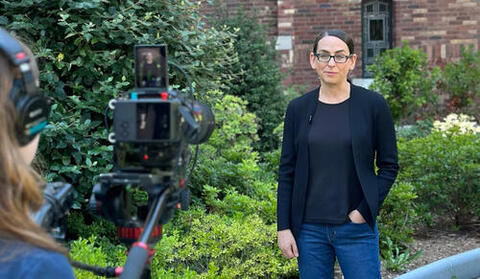3-2-1 liftoff! ‘Rocket Science for Everyone’ soars at Yale Online

Astrophysicist Marla Geha’s new Yale Online course about rocket science is, ahem, skyrocketing in popularity.
Yale astrophysicist Marla Geha was visiting U.S. Space Command in Colorado Springs, Colorado, appropriately enough, when she realized she needed to take her rocket science class global.
Geha, a professor of astronomy and of physics in the Faculty of Arts and Sciences, was touring Space Command last year with other academics as part of a fact-finding mission to see if there were common science problems that academia and the military were working on. While there, she spoke with a lieutenant general about ASTRO160 — a Yale course for non-science majors that delves into the basics of black holes, dark matter, exoplanets, and the ever-expanding number of satellites being shot into space.
Intrigued, the lieutenant general confided to Geha that he wished every member of his own team had taken a class like ASTRO160.
“That was the spark,” Geha said. “I thought that if Space Command didn’t have a good intro to rocket science class, then perhaps I could make mine available to help fill a gap.”
Mission accomplished. Geha’s free, Yale Online course, called “Rocket Science for Everyone,” debuted over the summer and became an immediate hit. More than 10,000 people enrolled in the course in its first two weeks, and more than 12,500 people have now taken it.
Yale offers a broad range of online courses in the humanities, sciences, and social sciences, working with Yale faculty. These courses, including both degree programs from professional schools and non-degree programs, are available on multiple platforms, including Coursera, YouTube, and Canvas.
“Rocket Science for Everyone,” for example, is a Coursera course that is available on demand, for free. It takes about five-hours to complete.
Aside from the catchy name and a breezy wit that infuses the lessons, “Rocket Science for Everyone,” produced by the Yale Poorvu Center for Teaching and Learning, boasts a deep knowledge of the essential role that rockets and space satellites now play in modern life.
There are more than 10,000 satellites orbiting the planet, with more coming online every month. The vast majority of them are in low-Earth orbit, Geha said, or “roughly 200 to 300 miles over our heads.”
